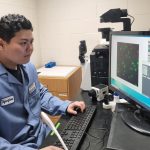New Hydrogel Offers Hope to Those Suffering Severe Complications of Crohn’s Disease
The composite results in faster and a higher degree of healing, reducing the volume of fistulas six-fold in comparison to the surgical treatment
Crohn’s disease is an inflammatory bowel disease that affects an estimated 780,000 Americans, with even higher rates reported in Canada and Europe. Among its many complications are perianal fistulas: tunnels that develop between the inside of the anus and the skin around it. Often resistant to treatment, severe fistulas can lead to incontinence, infertility, and decreased quality of life.
Johns Hopkins researchers have developed an injectable, biodegradable, mechanically fragmented nanofiber-hydrogel composite (mfNHC) loaded with stem cells that could bring a new treatment for fistulas. The composite results in faster and a higher degree of healing, reducing the volume of fistulas six-fold in comparison to the surgical treatment. The team’s results appear in Science Advances.
“These results are very exciting for the future of bio-stimulation tissue repair for chronic injuries even beyond PAF,” says Hai-Quan Mao, professor in Whiting School of Engineering’s Department of Materials Science and Engineering and one of the project’s core researchers. Mao is also director of Johns Hopkins Institute for NanoBioTechnology.
The mfNHC comprises a hydrogel of hyaluronic acid infused with electrospun nanofiber fragments, forming a fully integrated substance that breaks down in the human body slowly, according to Zhicheng Yao, a co-first author of this study and a PhD student in the Materials Science and Engineering program and mentee of Mao. The nanofibers give the substance enough stiffness so that the gel retains its shape, while still being porous enough to provide a scaffold for regenerative host cells, which migrate into the area and begin to rebuild the affected tissue. In the case of perianal fistulas, it is injected directly into the fissure to promote regeneration.
“Perianal fistulas in Crohn’s patients are notoriously difficult to treat. Our results could represent a new treatment paradigm to improve the quality of life for patients with Crohn’s disease”, says Florin Selaru, associate professor of medicine and oncology in the Johns Hopkins School of Medicine’s Division of Gastroenterology and Hepatology and director of the Meyerhoff Inflammatory Bowel Disease Center, and one of the project’s senior authors.
Though still working to understand bio-stimulation repair mechanism, the team plans to continue work on the composite, improving it “from a biomaterials perspective,” says Mao. “We are exploring the idea of a foam version as well.”
Zhicheng Yao co-led the team with Ling Li, a postdoc fellow working with Florin Selaru.
Story by Jack Darrell from the Department of Materials Science and Engineering.





